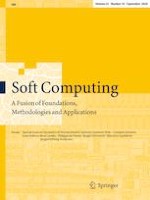18.09.2019 | Focus
Quantification of qualitative assessments using computing with words: in framework of fuzzy set theory
Erschienen in: Soft Computing | Ausgabe 18/2020
EinloggenAktivieren Sie unsere intelligente Suche, um passende Fachinhalte oder Patente zu finden.
Wählen Sie Textabschnitte aus um mit Künstlicher Intelligenz passenden Patente zu finden. powered by
Markieren Sie Textabschnitte, um KI-gestützt weitere passende Inhalte zu finden. powered by
